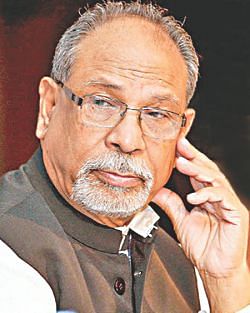MPs enjoy no or unlimited immunity from arrest?
MPs enjoy no or unlimited immunity from arrest?

BY surrendering to the Dhanmondi police station on Tuesday, sacked minister Abdul Latif Siddique has saved the police, the state minister for home, and the government as well, from being embarrassed further. What the police and the government policymakers have done since his return to Dhaka on Sunday night has raised questions about their sincerity to enforce the law. Siddique, who flew into Dhaka from India, has been facing around two dozen arrest warrants issued by different courts in connection with cases filed in 18 districts against him for his derogatory remarks hurting religious sentiments of people. Non-action of the police on Sunday night at the airport drew criticism. Some religion-based organisations had threatened to enforce countrywide hartal for Thursday if Latif was not arrested by Wednesday.
On Monday noon, State Minister for Home Affairs Asaduzzaman Khan Kamal came up with a ridiculous explanation for not arresting Latif at the airport on Sunday night. By saying that the permission of the Speaker was required to arrest Latif as he was an MP and the parliament was in session, the state minister put the onus on the Speaker. Speaker Shirin Sharmin Chowdhury did not take much time to clear the legal position. She dismissed the state minister's interpretation of the law regarding arrest of an MP. Yet, Latif could not be arrested until he surrendered at the police station at around 1:30 pm on Tuesday. It was reported that Latif surrendered in line with the advice of the government high-ups. However, the drama brought up some crucial questions, like whether MPs can be arrested when the parliament is in session.
The privilege, known as immunity against arrest, MPs enjoy during sessions of the parliament was first introduced for British MPs around 700 years ago. At the beginning it was a convention, according to which an MP could be arrested for a certain period. The time frame began 40 days before the beginning of the parliament session and ended 40 days after the session was prorogued. The MPs, however, could not enjoy the privilege for many years. The convention got legal coverage in 1770. Since then, they have been enjoying the privilege for avoiding arrest in connection with civil cases only. It does not provide them any immunity against criminal charges.
In 1815, an exceptional incident took place in the House of Commons. A British MP who had escaped from jail took a seat beside the Speaker's chair in the chamber of the House of Commons. The Commons had yet to begin the business of the day. That MP was arrested again prior to the beginning of the sitting. The matter was sent to the privilege committee of the House of Commons to examine whether the incident inside the chamber undermined the privilege of the parliament. The committee observed that the parliament's privilege was not undermined and thus there was no need to take action against the officer who had made the arrest. The rationale behind such immunity is significant. It helps MPs to discharge their roles in parliament uninterrupted.
MPs in India also enjoy immunity against arrest in connection with civil and revenue cases for a certain period of time, which begins 40 days before the Lok Sabha goes into session and ends 40 days after the session is prorogued. They, however, do not enjoy immunity or privilege against any criminal charge.
The interesting thing is that members of our Constituent Assembly had enjoyed such immunity only for a few months immediately after the country's independence. The Constituent Assembly Order 1972 had provided that a member of the assembly could not be arrested in connection with any civil or revenue related cases for a certain period. That time period began 14 days before the commencement of the session and continued for another 14 days after the session was prorogued. The Constituent Assembly was dissolved following the framing of the country's constitution and the Constituent Assembly Order 1972 ceased to have effect.
Currently, our MPs do not have any privilege or immunity against arrest. Our constitution enacted in 1972 empowers the parliament to make a law to determine the privilege of its members. But the parliament has yet to take such a move. Or it can be said none of the successive governments moved to make such a law to determine the privilege of the parliament and its members. Now, if a law enforcement agency needs to arrest an MP on any charge, they need to inform the Speaker about the arrest. The Speaker, according to the rules of procedure, informs the House, if it is in session, about it. Law enforcement agencies need permission of the Speaker if they want to arrest any MP within the premises of the parliament.
So, what the state minister said about requirement of permission of the Speaker to arrest Latif was wrong. Why, then, did the police fail to arrest Latif? Interestingly, law would have taken a different course had Latif been a member of an opposition party. In the past, none of the home ministers talked about the Speaker's permission to arrest any opposition MP. This shows that the law has two meanings and applications -- one for the ruling party MPs and another for the opposition MPs. MPs belong to ruling party enjoy unlimited immunity from prosecution for any wrongdoing while their rivals in the opposition camp have nothing. The double standard exposes the fragile state of the rule of law.
The writer is Senior Reporter, The Daily Star.